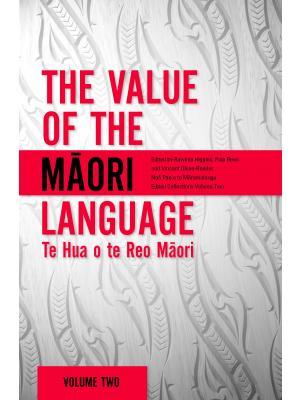
Year of publication
Publication type
BookPublisher(s)
Huia PublishersPublication ISBN
978-1-77550-002-5Author(s)
Associate Professor Rāwinia Higgins Associate Professor Poia Rewi Vincent Olsen-ReederEven though the Māori language obtained official language status some 27 years ago, Māori are still expending energy to revitalise and normalise the language within Aotearoa New Zealand. The challenge for Māori is to win the hearts and minds of mainstream New Zealanders, now and in the future to understand the enormous value of the language to the nation across the board – in education and media, in tourism and the broader economy, and to culture and society. Māori words, terms and phrases like ‘kia ora’, ‘haere mai’, ‘iwi’, ‘marae’, ‘haka’, kaumātua, ‘pōwhiri’, ‘hāngi’ and ‘moko’ are iconic to this country, and are recognised as should the entire Māori language. Imagine a country where we are all bilingual, speaking Māori as well as English. We would have access to two bodies of knowledge in a true partnership as envisaged with the Te Tiriti o (The Treaty of) Waitangi and would expand our country’s potential incredibly. To achieve this, the value of Māori language must be understood, appreciated and adopted at all levels of society – from the corridors of the classroom, to the corridors of Parliament. This book and symposium aims to facilitate the discussion, raise awareness and heighten the consciousness of society regarding the Māori language and potential or actual opportunities this brings for the country through its wholesale adoption by wider society. The book is the second in a Ngā Pae o te Māramatanga edited collection published by Huia publishers, and edited by Associate Professor Rāwinia Higgins, Associate Professor Poia Rewi, and Vincent Olsen-Reeder. It draws on research from a scholarly community to contribute to the value of the Māori language over the past 25 years and their aspirations for the future direction of the language. The 30 contributors are from a cross section of society – including leaders of the flax roots Kohanga Reo movement, Māori media entities, to policy people and politicians. The book aims to engage and reawaken Māori consciousness regarding the value of Māori language as an integral part of Māori and New Zealand’s development. Associate Professor Rāwinia Higgins, an editor of the book, NPM Principal Investigator and Head of School, Te Kawa a Māui, School of Māori Studies, Victoria University, states, “There is a lack of scholarship and writings focussed on the value of the Māori language since the passing of the Māori Language Act 1987. Language loss is a critical contributor to identity loss and challenges the very being of Māori at individual and societal levels which, in turn, can inhibit Māori development to its fullest potential”. To purchase the book please visit http://www.huia.co.nz/shop&item_id=5389